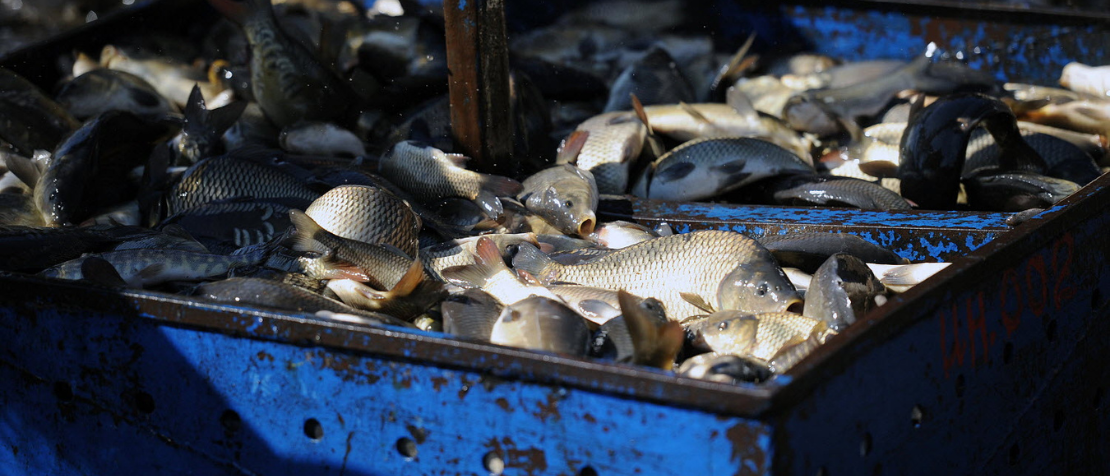Warm-water aquaculture in Tajikistan has considerable growth potential

©FAO/Sergei Gapon
The Food and Agriculture Organization of the United Nations (FAO) in partnership with Mohii Tojikiston, the Tajik national authority responsible for fisheries and aquaculture development, held a workshop on warm-water aquaculture 22–23 August in Dushanbe. The workshop provided a venue for discussion of the challenges and opportunities to development of the aquaculture sector in the country, and updated participants on current warm-aquaculture technologies and production systems.
In Central Asia, carp is the most farmed warm-water fish. Production is mainly of the common, silver, and grass species. In addition, there is also some limited farming of African catfish, channel catfish, snakehead, and tilapias. The culture of these species supports rural livelihoods and food security and provides a relatively affordable protein source for human consumption. Farming of filter-feeding warm-water species, such as the silver and bighead carps, is considered as some of the most environmentally sustainable culture species as their production results in relatively low carbon emissions and a minimal environmental footprint.
While Tajikistan is endowed with abundant water resources, including some of the largest rivers in Central Asia, fish production remains low. The aquaculture and fisheries sectors have not been developed to their full potential due to such factors as a lack of investment, and an absence of technical specialists and appropriate technology transfers. The prevalence of animal diseases, low levels of farm productivity, poor wastewater management systems, the impacts of climate change, the availability of water resources, broodstock management and the supply of quality fish seed to farmers are also impediments to sector growth. Despite these challenges, considerable opportunities exist to improve the warm-water aquaculture sector in Tajikistan. Species diversification based on consumer demand, enhancing networking capacities at national and regional levels, developing a common vision of sector development among national stakeholders, and promoting technology transfers are potential areas that could boost warm-water aquaculture production and incomes.
The workshop brought together 36 national participants, including representatives of government agencies and ministerial staff, the private sector, fish farmers and farm technicians, and researchers working in warm-water aquaculture. The workshop was comprised of technical presentations, and case studies from China, the largest global producer of aquaculture products, and from Hungary where carps are the dominant culture species in pond farming, as well as a field visit to a fish farm.
Mirali Naimov, Chair of Mohii Tojikiston, welcomed the participants to the webinar and delivered the opening remarks. He presented an overview of the development of the aquaculture and fisheries sectors in Tajikistan, the current government aid programme for fisheries and aquaculture sector development, and the State Programme on livestock, poultry, fishery, and bee keeping development for 2023–2027. Naimov noted that national fish production had increased considerably in recent years and attributed much of the success to existing government support programmes, and to technical assistance provided by FAO.
Ibrohim Ahmadov, FAO Technical Coordinator for government liaison, food security, nutrition, and emergency, gave an overview of FAO project activities in Tajikistan, including those projects supporting the fisheries and aquaculture sectors. Haydar Fersoy, FAO Senior Fishery and Aquaculture Officer, noted that from the perspective of global best practice, Tajikistan needed to focus on implementing a sustainable sectoral development programme that focused on the establishment of an appropriate governance system and good management practices.
During the workshop, the Freshwater Fisheries Research Center, Chinese Academy of Fisheries Sciences and Mohii Tojikiston signed a Memorandum of Understanding that calls for collaboration to support institutional and technical capacity building, the exchange of information, the training of researchers and ministerial staff, and the provision of technical assistance in all aspects of fisheries and aquaculture management and development.
31 August, Dushanbe, Tajikistan
Publication:The State of World Fisheries and Aquaculture 2022
